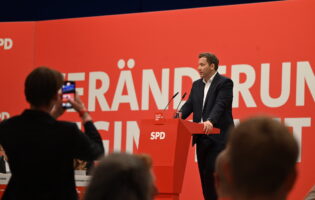The Future Role of NATO: Reinventing the Alliance?

Esther Kern
Esther Kern is a full intern during summer 2014 at AICGS. She is responsible for writing the AICGS Notizen Daily, assisting with the contact database, summarizing AICGS events, and contributing to the AICGS Notizen Blog. Her particular interest is the Foreign and Domestic Policy Program at AICGS.
Currently, Ms. Kern is enrolled at the Albert-Ludwigs-Universität Freiburg, where she is seeking for a BA in Political Science with a minor in History. She spent her Junior Year studying abroad at Connecticut College, where she had time to focus on U.S. foreign policy and the transatlantic relationship between Germany and the United States.
The discussion of the role of the North Atlantic Treaty Organization (NATO) in the current international system is as old as the end of the Cold War–by now nearly 25 years. Much of this debate centers around the question of whether NATO has outlived its usefulness. Following the classic formulation of Lord Ismay, didn’t the organization reach the purpose of its foundation “to keep the Russians out, the Americans in, and the Germans down?” Today, after the outbreak of the crisis in Ukraine, the debate is on its peak, again. It is the same old debate, which was just silent for a while through NATO’s role in the aftermath of 9/11. It is the debate of NATO’s long-term role in the future, where its place should be in the international system, and what exactly should be the tasks of its organization. Till today there are no sustainable answers to these questions.
Since the end of the Cold War, NATO adopted an “Open Door” policy, meaning that every European nation could join if it met the requirements. This led to three waves of expansion (1999, 2004 & 2009), including many member states of the former Warsaw Pact. NATO also reached out to Russia in order to build a cooperative relationship with the country and made efforts towards building a strategic partnership. The result of these efforts was the signing of the Founding Act on Mutual Relations, Cooperation, and Security. This relationship was upgraded with the creation of the NATO-Russia Council (NRC) in 2002.
This relationship which worked for the last 17 years could fall apart now because of Russia’s claims that NATO enlargement contains a threat for Russia and because of Russia’s actions in Ukraine. On April 1, the NATO Foreign Ministers decided to “suspend all practical cooperation with Russia, civilian and military, as a direct consequence of Russia’s illegal military intervention in Ukraine and of Russia’s violation of Ukraine’s sovereignty and territorial integrity.” The political dialogue in the NATO-Russia Council will continue to mainly discuss the crisis in Ukraine. After years of slightly improved cooperation with Russia, the situation in Ukraine puts NATO in a new position again. In September 2014, there will be another NATO summit meeting. At the meeting NATO member states have to take common positions on Ukraine and Russia. And again, there will be a clash between the “old” and the “new” Europe.
For the old Europe like Germany and France, Ukraine, its crisis, and Russian threats are far away, and besides this, Europe still has strong economic ties to Russia. For the new Europe like Poland and Romania, the threat is existential, and they want to have strong reassurance from NATO as well as from their European Union partners. The question is not that the situation in Ukraine is not acceptable. Rather, what has to be done about it, and what does it mean in the long-term view for NATO? Russia broke the order established after the Cold War. For NATO, this is essential because it means it also has to finally redefine its position in a new order which yet has to be found, but could be created by the organization itself. It also could mean that we will soon find ourselves in a renewed Cold War situation.
Reforms have been ongoing in NATO since the end of Cold War, but the organization could never reach the same level of legitimacy that it had during the Cold War. It also seems that the undertaken reforms were unsustainable without actually giving NATO a new legitimate role in the international system. The reforms made by NATO were attempts to make NATO more flexible, more adapted to a new order, but it failed to provide answers to questions of a sustainable future of the alliance. NATO was questioned by many, and more than a few asked for its abolition. This does nothave to be case.
NATO can play and should play a relevant role in the current international system. It probably can be criticized for a few things like the wisdom of its Eastern European enlargement, its reluctance to take strong actions in Georgia or Ukraine, and also of the funding inequality among member states. However, one has to admit that it has brought a sense of security and stability to Europe. No military other alliance was that successful in the twentieth century. It is now time to debate its nature, its priorities, and its tasks in twenty-first century. NATO has already changed from being just a single security alliance. It needs to see even more the challenges of the twenty-first century.
One course could be to rather focus on its political role, rather than on its military one. A different one could be the integration of NATO in the European Union. Or even the abolition of the organization while still having an Atlantic alliance with a redefined purpose and different priorities. These are just a few ideas of a reinventing of NATO. Now that the postwar international order has been broken in, it has the chance to do exactly this. The debate is already going on; it is just a question of whether the members of NATO will, once again, get stuck in bureaucracies and small details or if they can see the broader picture and the possible future of NATO as a corner stone of a stable international security system.









